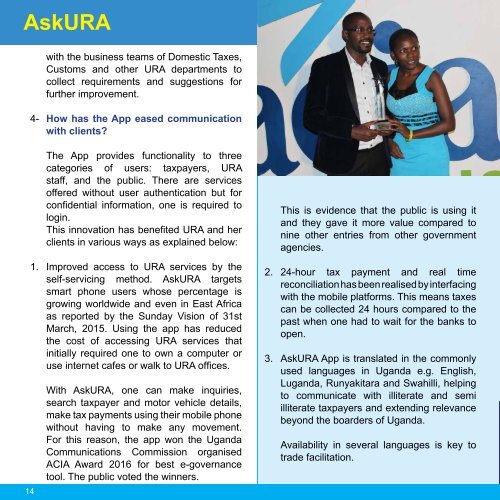Taxman 6
You also want an ePaper? Increase the reach of your titles
YUMPU automatically turns print PDFs into web optimized ePapers that Google loves.
AskURA<br />
INTERVIEW<br />
with the business teams of Domestic Taxes,<br />
Customs and other URA departments to<br />
collect requirements and suggestions for<br />
further improvement.<br />
4- How has the App eased communication<br />
with clients?<br />
14 14<br />
The App provides functionality to three<br />
categories of users: taxpayers, URA<br />
staff, and the public. There are services<br />
offered without user authentication but for<br />
confidential information, one is required to<br />
login.<br />
This innovation has benefited URA and her<br />
clients in various ways as explained below:<br />
1. Improved access to URA services by the<br />
self-servicing method. AskURA targets<br />
smart phone users whose percentage is<br />
growing worldwide and even in East Africa<br />
as reported by the Sunday Vision of 31st<br />
March, 2015. Using the app has reduced<br />
the cost of accessing URA services that<br />
initially required one to own a computer or<br />
use internet cafes or walk to URA offices.<br />
With AskURA, one can make inquiries,<br />
search taxpayer and motor vehicle details,<br />
make tax payments using their mobile phone<br />
without having to make any movement.<br />
For this reason, the app won the Uganda<br />
Communications Commission organised<br />
ACIA Award 2016 for best e-governance<br />
tool. The public voted the winners.<br />
This is evidence that the public is using it<br />
and they gave it more value compared to<br />
nine other entries from other government<br />
agencies.<br />
2. 24-hour tax payment and real time<br />
reconciliation has been realised by interfacing<br />
with the mobile platforms. This means taxes<br />
can be collected 24 hours compared to the<br />
past when one had to wait for the banks to<br />
open.<br />
3. AskURA App is translated in the commonly<br />
used languages in Uganda e.g. English,<br />
Luganda, Runyakitara and Swahilli, helping<br />
to communicate with illiterate and semi<br />
illiterate taxpayers and extending relevance<br />
beyond the boarders of Uganda.<br />
Availability in several languages is key to<br />
trade facilitation.


